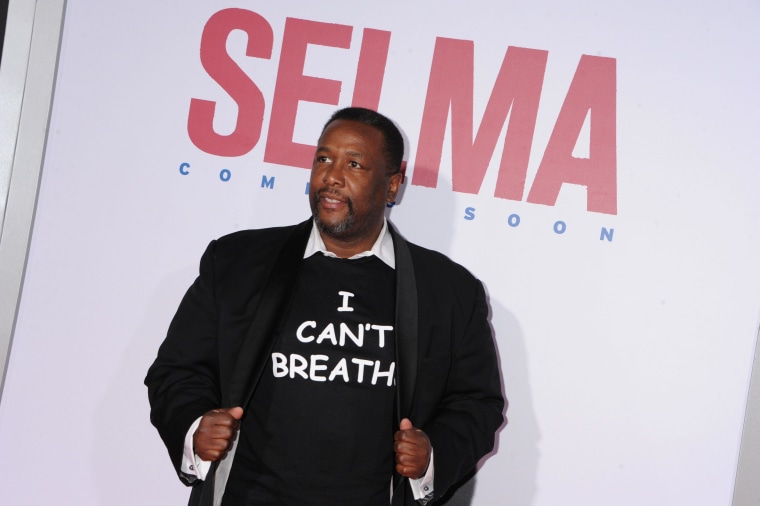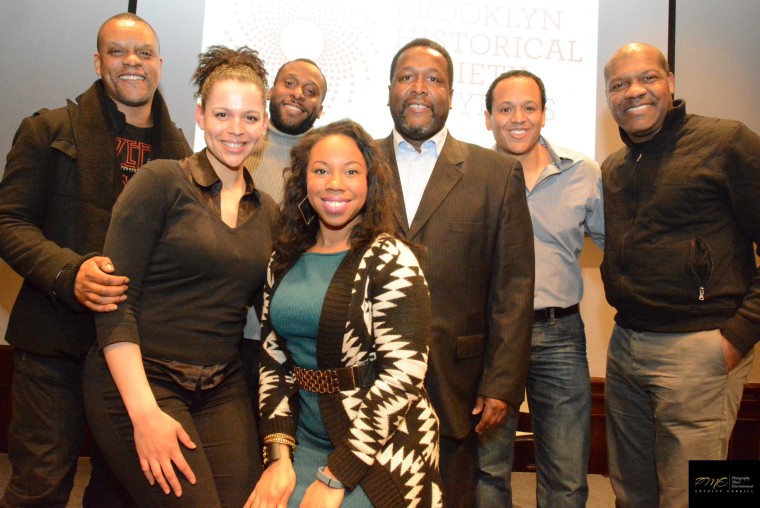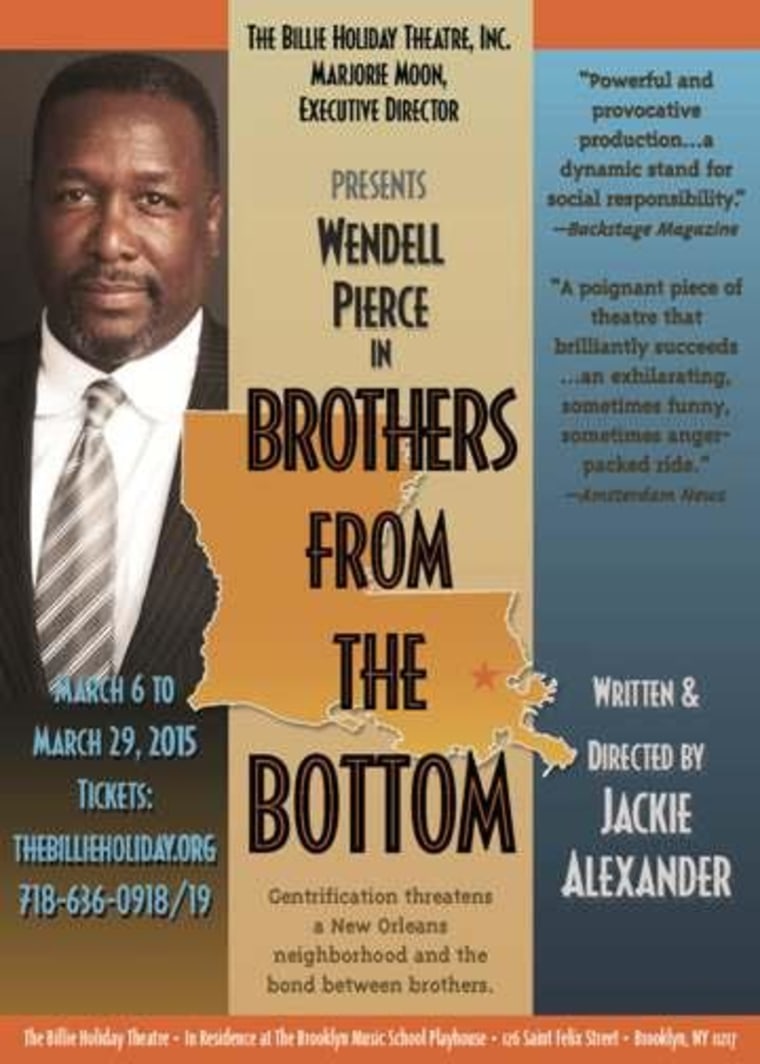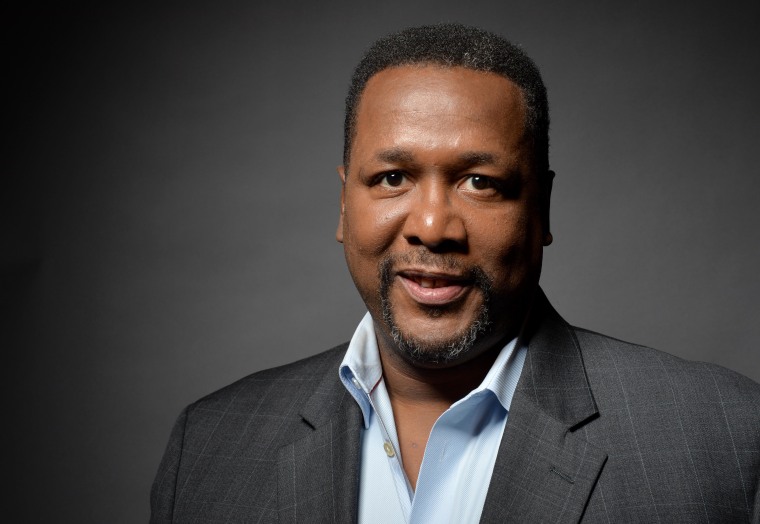Wendell Pierce has scored an impressive list of television and film production credits in recent years. In the historical drama “Selma,” he played civil rights leader Hosea Williams. Perhaps best known for his work on the two critically acclaimed HBO series – “The Wire” and “Treme’,” Pierce is a man who stays on the move. He is currently shooting “Ray Donovan” on Showtime, “Suits” on the USA Network, and this season he plays Teddy – Oscar Madison’s (Matthew Perry) friend - in a remake of “The Odd Couple.”
But the stage is where Pierce’s heart is and the place his career started; he is a Juilliard trained stage actor that made his Broadway debut in August Wilson’s “Fences.” Admittedly, a return to the stage is long overdue. On March 6, Pierce starts a four weekend run in the off-Broadway play “Brothers from the Bottom” at The Billie Holiday Theatre in Brooklyn.
The play is set in a post-Katrina New Orleans, four years after the storm and it involves two brothers driving toward resolve on matters complicated by the tragedy, and gentrification.
Pierce recently spoke to NBCBLK contributor Derrick Hemphill about his new play, gentrification, the importance of African-American actors doing small theatre, and his new role in “The Odd Couple.”

Derrick: "Brothers from the Bottom" could not deliver a timelier topic — gentrification. Gentrification in New Orleans, at that, where home prices have sky-rocketed and New Orleans' black residents find themselves locked out. Do you think we're too reactive at this game or do you think we simply lack the capital to play?
Wendell: It's not just a matter of capital, it's a matter of resources. When I say resources that means political capital, monetary capital, and social capital. Social capital is the fact that so much of the culture comes from our community that we should exacerbate that and use it to our advantage. If you want to come and hear our music, enjoy our cuisine, here's how we're going to facilitate that so that we can reap the benefits of it. Political capital is making sure the city government responds to our needs.
Is there a neighborhood that stands out when thinking about gentrification in New Orleans?
The Bywater is a perfect example. A lot people who come to the Bywater are assuming that the people that lost their homes in Bywater didn't really appreciate it the way that they could. The problem was, we couldn’t get services from our city government and that's on people in the Bywater who didn't enact their political power. We have institutionalized classism and racism where you can`t get capital directly from the institutions that you need so that you can revitalize [your home].
We didn't take advantage of exercising our right of self-determination when it came, culturally. So these culture vultures who have come and now have expropriated cultures and traditions that they would never do in other communities. They’re re-appropriating it and then also using that cultural capital. That's the thing that is at the heart of the conflict of gentrification and cultural gentrification in New Orleans.
So in the heart of Bywater it is this activity that you see socially, culturally, economically appropriated traditions and gentrification. You say, well here's the deal, we won’t participate in this culinary world until our culinary arts start to reap some of the benefits of whatever economic revenues that are going to come here. So that is at the heart of what gentrification is in New Orleans.

What attracted you back to the stage?
Well the attraction to the stage is to make sure to exercise those muscles that I took four years to try to train. It's a great challenge. We worked in three minute spurts in film instead of three hour periods of time like a play and it's just a challenge to your acting chops that I always want to do a play, a television show ... or episode ... and a movie a year. I try to do all three every year.
Other than the obvious politics of this play, what was it that resonated with you about "Brothers from the Bottom" that made you say, 'I have to do this play?'
First of all, I saw the play in rehearsal — dress rehearsal — before they did it a couple years ago. I was anticipating what has happened in New Orleans over the past couple years. So I said "Okay, now's the time to do it."
As an artist, no matter where you are in your journey, you should remember to be supportive of smaller theaters that need your help and vice versa. These theaters give an opportunity for you to investigate and challenge yourself, which this play is doing. So, really challenging me. Getting back on stage and challenging my chops.
At the same time, I hope that whatever recognition that I have acquired can then bring some attention to this small theater [The Billie Holiday Theatre] that I learned about when I first came from New Orleans 30 years ago. To bring attention of the artist community in Brooklyn that highlights what they've been doing for 40 plus years.
How difficult is it to meet the grueling demands of the stage with your busy television and film schedule?
They meet me halfway and make sure that I still have time to do filming work during the week and then come and do the play on the weekends. So it's mutually beneficial.
I've always believed that as actors, we should try to find a way to do stage work and I'm really hurt by the disconnect of a generation of African-American actors who — like myself and Ving Rhames, Charles Dutton, Penny Johnson, Lorraine Toussaint, Angela Bassett, Courtney Vance, Michael Beach, Andre Braugher, Lisa Gay Hamilton, Viola Davis, Eriq La Salle — are a generation of trained classical actors from Yale, Julliard and NYU. Yet the Negro Ensemble Company is basically null and void now.
In the '80s as we were coming out of training programs there was a schism, there was a conflict between the established off-Broadway theater companies that focused on the works of black playwrights and really was an incubator for black talent.
We disconnected and the whole generation has gone on to become so successful in film and television and other off-Broadway and regional theater companies. But yet the NEC has died.
I attended a panel a couple weeks ago with Lisa Gay Hamilton, Tonya Pinkins and Lillias White.
I know all of them, all good friends.
They talked about some of August Wilson's plays and those black actors who were there at the beginning with them in "The Piano Lesson" and "Fences," and I know you have acted in both.
I also produced "Radio Golf" on Broadway, and I produced "Jitney" off-Broadway and the two of those were my first forays into producing. And I did "Jitney" in New Orleans, I did "Joe Turner" at Philadelphia Drama Guild. Made my Broadway debut in "Fences" on Broadway. I actually took over from Charles Dutton. Trivia question now — people don't really remember that. I took over for Charles Dutton and did two or three months.
So it's something akin to a ‘rite of passage’ for African-American actors.
August Wilson, the time that he was alive and writing, is the equivalent of what it was like for American actors in the time of Tennessee Williams and Arthur Miller in the mid 20th century. It was a vibrant time. August Wilson's work will outlive us as a cultural documentation of one of the great American playwrights. It was very special to be an actor at that time as he was writing. His plays will go on and on forever, and so many people will discover them and be discovered by them.
It will never be like those first times. Like in the '80s and the '90s when we, collectively, as a repertory group of actors that happened to be working at that time, were able to flush out his material. It was cherished and it will never be forgotten.
I know you were raised in the New Orleans subdivision Pontchartrain Park. Which is a post-war middle class neighborhood. I think you guys had an 18-hole golf course, luscious green lawns. Exclusive home ownership, all of your neighbors were black. Is this not the antithesis of gentrification?
What Pontchartrain Park is today?
What it was then. It looks like we were making progress, and that progress has now either slowed, or there's some reversals.
We have examples around the country that should be templates for the way we should approach empowering our communities. Culturally and economically we have so many great examples: What Baldwin Hills is to Los Angeles. What Sweet Auburn was to Atlanta. In Brooklyn, there was Weeksville, where free men of color literally said, I'm going to buy all of this property in Brooklyn. I'm going to subdivide it, make sure and put houses on every parcel, and going to reach out to people who get their freedom, to make sure that they can come. We're going to pool our resources and start our own community.
That's the same thing like Pontchartrain Park. It came out of a great civil rights movement. A.P. Tureaud, the great civil rights lawyer in New Orleans, who lead an effort to end segregation in the parks and green spaces.
Out of this advocacy, Pontchartrain Park was born. Even though it was separate but equal, it was going to be 200 acres set aside separate so black folks can buy, in this new post World War II subdivision. But we took something ugly, separate but equal, and made it beautiful by making it an incubator for talent. The Morial family was there, and [EPA director] Lisa Jackson, Terence Blanchard — who's a Grammy award-winning musician, and myself came out of there.
I can't think of any TV sitcom remakes, but you're starring in a remake of "The Odd Couple" as the character named Teddy. Is the remake of TV sitcoms an idea whose time has come?
Sitcoms are always redone, they’re dressed up another way. "Two and a Half Men" is nothing but "The Odd Couple." "Two Broke Girls" is another example of "The Odd Couple." I would say "Will and Grace" is an example of an odd couple. Two people who have to share living space who actually are polar opposites and you see the conflict between the two in a situational comedy. They actually did a remake with an all black Oscar and Felix. We're just trying to bring a new show, a new concept to "The Odd Couple" and put it out there to audiences that haven't seen the original.
Whose friend is Teddy's? Felix or Oscar's?
I'm Oscar's friend. I'm his friend and agent. Loosely based on Murray the cop in their original. I wanted to stay the cop, but not a lot of cops go on the beat anymore like Murray did, so ...
Cops are not necessarily popular either.
True.

[See Wendell Pierce in “Brothers from the Bottom” weekends from March 6 – 29 at The Billie Holiday Theater in Brooklyn, NYC]
Note: This interview has been edited and condensed for clarity
